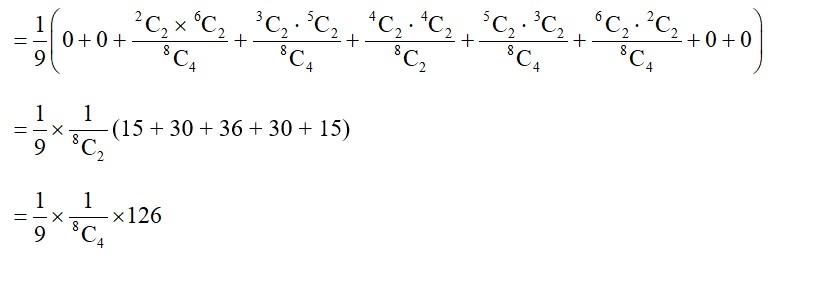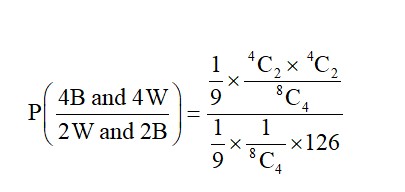Let Bi (i = 1, 2, 3) be three independent events in a sample space. The probability that only B1 occurs is
a, only B2 occurs is b and B3 occurs is Let p be the probability that none of the events B1 occurs and these 4 probabilities satisfy the equations (a - 2b) = ab and (b - 3
p =
(All the probabilities are assumed to lie in the integral (0, 1)). The
is equal to_________.
Let Bi (i = 1, 2, 3) be three independent events in a sample space. The probability that only B1 occurs is a, only B2 occurs is b and B3 occurs is Let p be the probability that none of the events B1 occurs and these 4 probabilities satisfy the equations (a - 2b) = ab and (b - 3 p = (All the probabilities are assumed to lie in the integral (0, 1)). The is equal to_________.
-
1 Answer
-
Let P (B1) = a P (B2) = b P (B3) = c
Given a (1 – b) (1 – c) = a . (i)
b (1 – a) (1 – c) = b . (ii)
c (1 – b) (1 – a) =
(1 – a) (1 – b) (1 – c) = p . (iv)
->a – ab – 2b + 2ab = ab Þ a = 2b . (v)
Again
->b – bc – 3c + 3bc = 2bc Þ b = 3c . (vi)
...more
Similar Questions for you
P (2 obtained on even numbered toss) = k (let)
P (2) =
P (
If x = 0, y = 6, 7, 8, 9, 10
If x = 1, y = 7, 8, 9, 10
If x = 2, y = 8, 9, 10
If x = 3, y = 9, 10
If x = 4, y = 10
If x = 5, y = no possible value
Total possible ways = (5 + 4 + 3 + 2 + 1) * 2
= 30
Required probability
P (2W and 2B) = P (2B, 6W) × P (2W and 2B)
+ P (3B, 5W) × P (2W and 2B)
+ P (4B, 4W) × P (2W and 2B)
+ P (5B, 3W) × P (2W and 2B)
+ P (6B, 2W) × P (2W and 2B)
(15 + 30 + 36 + 30 + 15)
Let probability of tail is
⇒ Probability of getting head =
∴ Probability of getting 2 heads and 1 tail
ax2 + bx + c = 0
D = b2 – 4ac
D = 0
b2 – 4ac = 0
b2 = 4ac
(i) AC = 1, b = 2 (1, 2, 1) is one way
(ii) AC = 4, b = 4
(iii) AC = 9, b = 6, a = 3, c = 3 is one way
1 + 3 + 1 = 5 way
Required probability =
Taking an Exam? Selecting a College?
Get authentic answers from experts, students and alumni that you won't find anywhere else
Sign Up on ShikshaOn Shiksha, get access to
- 66k Colleges
- 1.2k Exams
- 681k Reviews
- 1800k Answers


